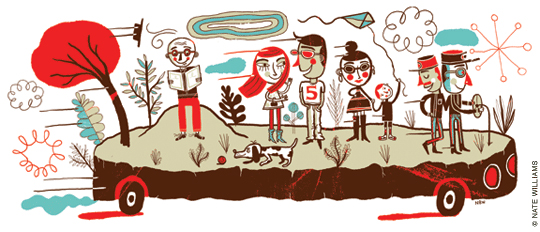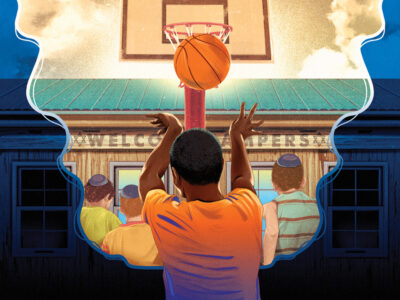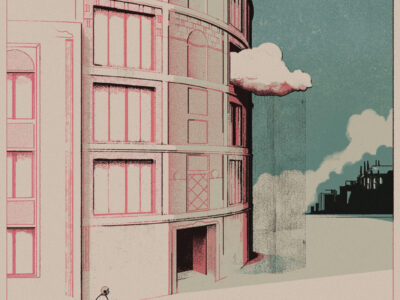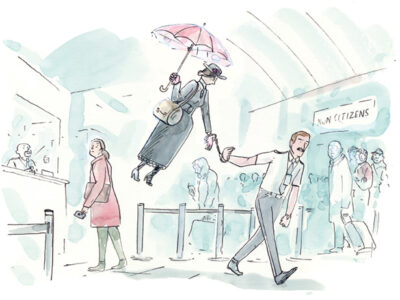
On the night bus across northern Spain.
By Beebe Bahrami
A spiky short-haired blonde with sugary pink lips and eyes heavily shadowed in blue was applauding me in Spanish to two other women. “There’s a real woman,” she said with a slight Portuguese accent. “She knows how to piss in pot, no matter what the size!”
I’d just come out of a restroom stall at a desolate roadside stop God-knew-where in northern Spain. It was 2:30 in the morning. In my sleepless state, the woman’s big lips, eyes, and hair took on circus proportions. The fluorescent lighting and the drip-drip-drip of the faucet distorted her masculine beer belly and her speech. I was already in Alice in Wonderland territory. The stall I’d just exited had been built for a child. I’d taken a much-needed and copious pee in a Lilliputian toilet bowl intended for potty training. It was the only toilet available.
I smiled. I even bowed a little. What the hell. We were all in this together.
Hours earlier, I’d managed to escape another circus act, that of Barcelona beset by summer throngs of gullible tourists and slick pickpockets. A train crash that day had not only derailed the travels of its passengers, but had halted the movement of over 80,000 people to and from the city. The city’s entire rail system had ground to a stop. Train station ticket vendors shut their windows without explanation and everyone rushed to the bus depots to find a way out.
Now, I like Barcelona, but I’d already had my fill of the summer frenzy of Spain’s most-visited city. I’d come for work and had accomplished my mission, and after some tapas and cava I wanted to be done with the place. So I walked up to the last bus ticket booth still open, and after a long wait, ran down my options. Any route to the west would let me stay on track with my work. But I’d already hit the booths of five different bus companies serving different parts of Spain, and the news at each one had been the same: sold out. Another aspiring Barcelona escapee helpfully informed me that car rentals were overloaded now too.
“Are there any buses to Bilbao?” I actually had a friend there—who was expecting me at her doorstep that night.
“No. That bus sold out first.”
“How about Pamplona?”
“No.”
“San Sebastián? Madrid? Zaragoza?”
“No. No. No.”
I’ll give it to him: he was patient.
“How far west do I have to go to get out of here?” I finally blurted.
“The bus to Oviedo still has seats. It also goes all the way to Gijon. Would you like a ticket?”
Oviedo. My favorite Spanish town. It was a good thing this was a year before Woody Allen would send his title characters there in Vicky, Cristina, Barcelona, putting Oveido on the map for many English speakers. Otherwise the tourists would have snapped up all the seats on this bus, too.
“When does it leave?”
“At six tonight. And it arrives at 6:30 in the morning.”
I looked at my watch. It was 10:30am. I wasn’t thrilled, but it was my ticket out of Dodge.
“I’ll take it.”
The bus bound for Oviedo then Gijon left right on time. There were no tourists on board. My companions were all on their way home to Asturias, the coastal Atlantic province for which Oviedo is the capital city. The spiky blonde with a passion for beer and hot pink lips was from Galicia. From Oviedo she was going even farther west than I was. In the meantime, we had two bus drivers to assure that one kept the other awake and in good company.
We pulled out of Barcelona as the sun lowered before us in the sky, and drove through the vast vineyards of western Catalonia and onward toward Aragón, Navarra, Cantabria, and Asturias. When the sun finally set, we were so far from Spain’s beaten track that vast fields and mountains sped by without so much as a light in a window. Every now and then there would be a glimpse of one haunting lamp burning on some distant main street of a hamlet so small that sheep outnumbered human inhabitants 10 to one. Signs whisked by for the main destinations: Llerida, Zaragoza, Pamplona, Logroño, Burgos, León, and finally Oviedo.
I’d had no idea that there was so much unoccupied expanse in Spain. The impact of urban migration and the decline of the villages hit me. But on the bus, I discovered that village life was still intact.
Our drivers filled the roles of village mayor and sidekick. They bantered like girlfriends, mostly to each other, but to our entertainment throughout the entire sleepless night.
“I keep telling her, don’t make the omelet so dry,” one began. “Use more onions and really caramelize them in a lot of olive oil first.”
The other nodded. “Por cierto, of course. What was she thinking? I understand what you mean. The other day, when I wore the blue shirt—you know, the one I had just bought and really love? My wife said nothing. I think I look good in blue.”
His mate chimed in, “Of course you do.”
“Then why didn’t she say anything? I wore it for her.”
His companion shrugged, and I could see his empathetic face in the rearview mirror when he replied, “What do you expect? Some women just don’t notice things. But you look good in blue my friend, don’t doubt it.”
Their bosom-buddy chatter sent two young women across the aisle from me into fits of hysterical but unnoticed laughter. Wiping tears from her eyes, one of them leaned toward me and whispered, “They sound more like girls than we do!”
And so they did—until someone did something stupid on the road. Then the bravado and chest pounding came out. Near Zaragoza a cargo truck with Portuguese plates suddenly pulled in front of us without using his turn signal. The bus driver behind the wheel rolled down his window and yelled, “¿Y ahora te haces cojones?” So now you decide to have balls? He glared and shook his fist. Then rolled up the window and resumed his girly chitchat with his colleague.
On the bus, passengers somehow morphed into a band of longtime neighbors and friends who looked out for each other. Food and drink was quickly and generously offered to quench hunger and thirst. If an old drunkard got on, no one let him sit next to a woman or man he could molest. If someone’s purse fell onto the floor, someone else picked it up. As people drifted into sleep, at least one person seemed to stay awake—the night sentry watching over his or her sheep. And when the bus made its last and longest pit stop in the early morning, the blonde from Galicia was there to compliment my ability to piss like a man.
After maneuvering the little bowl, which my female companions used after me in their turn, we all took in a very early breakfast at the roadside stop’s cafe before reboarding the bus at 3:15. Three hours later we arrived in Oviedo. The bus drivers and the passengers all said goodbye to each other. One by one, the village dispersed.
As if they had worked a transformative magic on the road, I quickly found a place to stay, even if I did have to roust an elderly man from his slumber to open the door and hunt for the room key. For a mere 25 euros I landed a clean room with a private bath whose sink, counter, and floors were made of an ethereal pink marble. The bed was cozy with thick, white, ironed sheets. It was a Ma and Pa hostel run with integrity and pride. The village had extended itself even here, and I realized that this was what made the Spanish who they are. Whether in the city or the countryside, they treat each other as if they live in the same little hamlet, where one’s behavior still matters and will be noted.
As the sun rose outside my room’s balcony and Oviedo woke up, I sank into a delicious deep sleep, in the bosom of the village.
This is one of many adventures that befell Beebe Bahrami Gr’95 as she researched The Spiritual Traveler Spain—A Guide to Sacred Sites and Pilgrim Routes (Paulist Press/HiddenSpring Books, 2009).




